What’s a Healthy Family
英语作文:What’s a Healthy Family
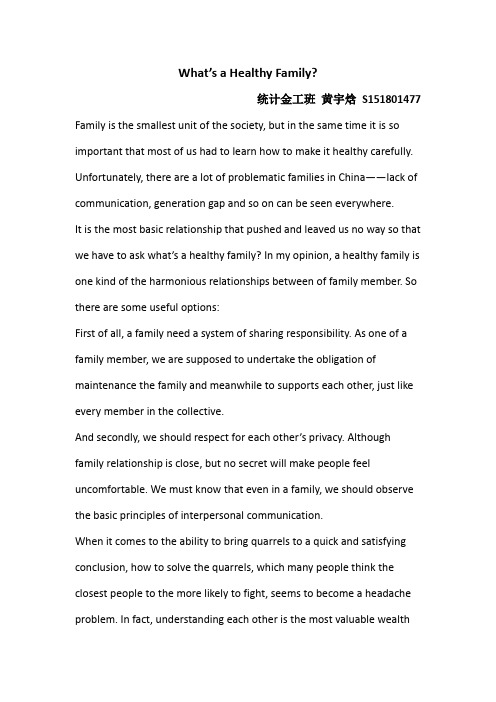
What’s a Healthy Family?统计金工班黄宇焓S151801477 Family is the smallest unit of the society, but in the same time it is so important that most of us had to learn how to make it healthy carefully. Unfortunately, there are a lot of problematic families in China——lack of communication, generation gapand so on can be seen everywhere.It is the most basic relationship that pushed and leaved us no way so that we have to ask what’s a healthy family?In my opinion, a healthy family is one kind of the harmonious relationships between of family member. So there are some useful options:First of all, a family need a system of sharing responsibility. As one of a family member, we are supposed to undertake the obligation of maintenance the family and meanwhile to supports each other, just like every member in the collective.And secondly, we should respect for each other’s privacy. Although family relationship is close, but no secret will make people feel uncomfortable. We must know that even in a family, we should observe the basic principles of interpersonal communication.When it comes to the ability to bring quarrels to a quick and satisfying conclusion, how to solve the quarrels, which many people think the closest people to the more likely to fight, seems to become a headache problem. In fact, understanding each other is the most valuable wealthwe should have,especially in family members.What’s more, clearing parental guidelines on right and wrong is necessary. Whoever we socialize with should general the communal contract, even the person is parent or son.Last but not the least, it is high time to do some easy interaction among all family members, which is good for these relationships. And in the end, I sincerely hope that everyone will have a healthy family.。
WhatMakesaGoodLife幸福的生活哪里来
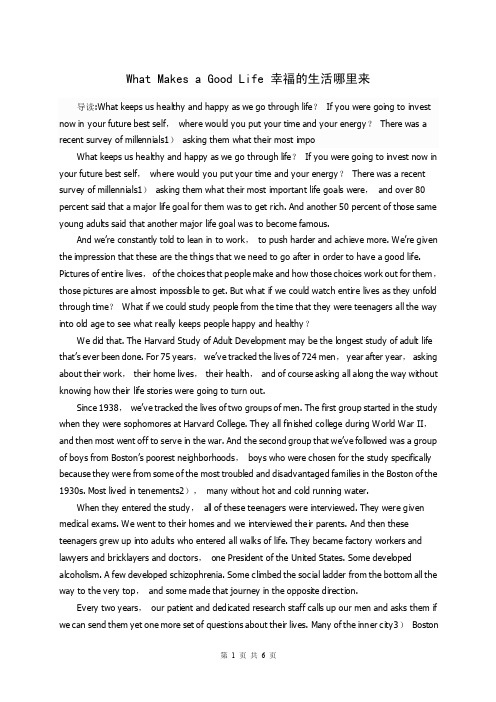
What Makes a Good Life 幸福的生活哪里来导读:What keeps us healthy and happy as we go through life?If you were going to invest now in your future best self,where would you put your time and your energy?There was a recent survey of millennials1)asking them what their most impoWhat keeps us healthy and happy as we go through life?If you were going to invest now in your future best self,where would you put your time and your energy?There was a recent survey of millennials1)asking them what their most important life goals were,and over 80 percent said that a major life goal for them was to get rich. And another 50 percent of those same young adults said that another major life goal was to become famous.And we’re constantly told to lean in to work,to push harder and achieve more. We’re given the impression that these are the things that we need to go after in order to have a good life. Pictures of entire lives,of the choices that people make and how those choices work out for them,those pictures are almost impossible to get. But what if we could watch entire lives as they unfold through time?What if we could study people from the time that they were teenagers all the way into old age to see what really keeps people happy and healthy?We did that. The Harvard Study of Adult Development may be the longest study of adult life that’s ever been done. For 75 years,we’ve tracked the lives of 724 men,year after year,asking about their work,their home lives,their health,and of course asking all along the way without knowing how their life stories were going to turn out.Since 1938,we’ve tracked the lives of two groups of men. The first group started in the study when they were sophomores at Harvard College. They all finished college during World War II,and then most went off to serve in the war. And the second group that we’ve followed was a group of boys from Boston’s poorest neighborhoods,boys who were chosen for the study specifically because they were from some of the most troubled and disadvantaged families in the Boston of the 1930s. Most lived in tenements2),many without hot and cold running water.When they entered the study,all of these teenagers were interviewed. They were given medical exams. We went to their homes and we interviewed their parents. And then these teenagers grew up into adults who entered all walks of life. They became factory workers and lawyers and bricklayers and doctors,one President of the United States. Some developed alcoholism. A few developed schizophrenia. Some climbed the social ladder from the bottom all the way to the very top,and some made that journey in the opposite direction.Every two years,our patient and dedicated research staff calls up our men and asks them if we can send them yet one more set of questions about their lives. Many of the inner city3)Bostonmen ask us,“Why do you keep wanting to study me?My life just isn’t that interesting.” The Harvard men never ask that question. To get the clearest picture of these lives,we don’t just send them questionnaires. We interview them in their liv ing rooms. We get their medical records from their doctors. We draw their blood,we scan their brains,we talk to their children. We videotape them talking with their wives about their deepest concerns. And when,about a decade ago,we finally asked the wives if they would join us as members of the study,many of the women said,“You know,it’s about time.”So what have we learned?What are the lessons that come from the tens of thousands of pages of inf ormation that we’ve generated on these lives?Well,the lessons aren’t about wealth or fame or working harder and harder. The clearest message that we get from this 75-year study is this:Good relationships keep us happier and healthier. Period.We’ve l earned three big lessons about relationships. The first is that social connections are really good for us,and that loneliness kills. It turns out that people who are more socially connected to family,to friends,to community,are happier,they’re physica lly healthier,and they live longer than people who are less well connected. And the experience of loneliness turns out to be toxic. People who are more isolated than they want to be from others find that they are less happy,their health declines earlier in midlife,their brain functioning declines sooner and they live shorter lives than people who are not lonely. And the sad fact is that at any given time,more than one in five Americans will report that they’re lonely.And we know that you can be lonely in a crowd and you can be lonely in a marriage,so the second big lesson that we learned is that it’s not just the number of friends you have,and it’s not whether or not you’re in a committed relationship,but it’s the quality of your close relationshi ps that matters. It turns out that living in the midst of conflict is really bad for our health. High-conflict marriages,for example,without much affection,turn out to be very bad for our health,perhaps worse than getting divorced. And living in the midst of good,warm relationships is protective.Once we had followed our men all the way into their 80s,we wanted to look back at them at midlife and to see if we could predict who was going to grow into a happy,healthy octogenarian4)and who wasn’t. A nd when we gathered together everything we knew about them at age 50,it wasn’t their middle age cholesterol levels that predicted how they were going to grow old. It was how satisfied they were in their relationships. The people who were the most satisfied in their relationships at age 50 were the healthiest at age 80. And good,close relationships seem to buffer us from some of the slings and arrows5)of getting old. Our most happily partnered men and women reported,in their 80s,that on the days when they had more physical pain,their mood stayed just as happy. But the people who were in unhappy relationships,on the days when theyreported more physical pain,it was magnified by more emotional pain. And the third big lesson that we learned about relat ionships and our health is that good relationships don’t just protect our bodies,they protect our brains. It turns out that being in a securely attached relationship to another person in your 80s is protective,that the people who are in relationships where they really feel they can count on the other person in times of need,those people’s memories stay sharper longer. And the people in relationships where they feel they really can’t count on the other one,those are the people who experience earlier memory decline. And those good relationships,they don’t have to be smooth all the time. Some of our octogenarian couples could bicker6)with each other day in and day out,but as long as they felt that they could really count on the other when the going got tough,those arguments didn’t take a toll7)on their memories.So this message,that good,close relationships are good for our health and well-being,this is wisdom that’s as old as the hills8). Why is this so hard to get and so easy to ignore?Well,we’re human. What we’d really like is a quick fix,something we can get that’ll make our lives good and keep them that way. Relationships are messy and they’re complicated and the hard work of tending to family and friends,it’s not sexy or glamorous. It’s also lifelong. It never ends. Just like the millennials in that recent survey, many of our men when they were starting out as young adults really believed that fame and wealth and high achievement were what they needed to go after to have a good life. But over and over,over these 75 years,our study has shown that the people who fared the best were the people who leaned in to relationships,with family,with friends,with community.So what about you?Let’s say you’re 25,or you’re 40,or you’re 60. What mi ght leaning in to relationships even look like?Well,the possibilities are practically endless. It might be something as simple as replacing screen time with people time or livening up a stale relationship by doing something new together,long walks or date nights,or reaching out to that family member who you haven’t spoken to in years,because those all-too-common family feuds9)take a terrible toll on the people who hold the grudges10).I’d like to close with a quote from Mark Twain. More than a c entury ago,he was looking back on his life,and he wrote this:“There isn’t time,so brief is life,for bickerings,apologies,heartburnings,callings to account. There is only time for loving,and but an instant,so to speak,for that.” The good life is built with good relationships.在我们的生命历程中,是什么使我们保持健康、快乐呢?如果你现在要为未来投资,成为最好的自己,你会把时间和精力放在哪儿呢?最近有一项对千禧一代的调查,询问他们最重要的人生目标是什么,超过80%的人说他们的一个主要人生目标是变得富有。
八年级英语上册课文翻译全文
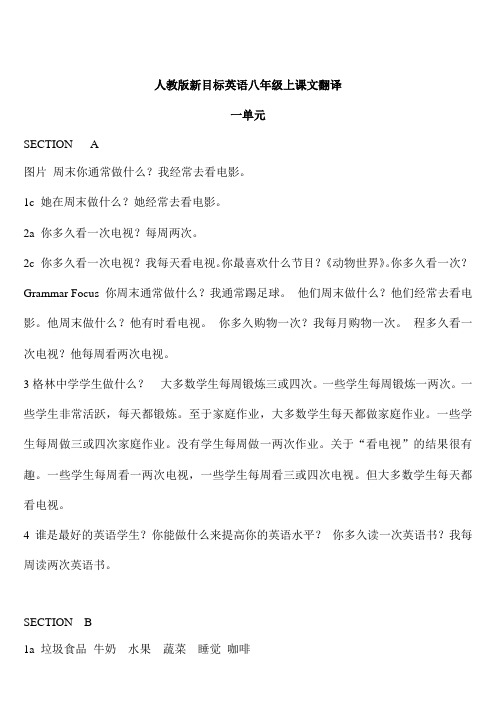
人教版新目标英语八年级上课文翻译一单元SECTION A图片周末你通常做什么?我经常去看电影。
1c 她在周末做什么?她经常去看电影。
2a 你多久看一次电视?每周两次。
2c 你多久看一次电视?我每天看电视。
你最喜欢什么节目?《动物世界》。
你多久看一次?Grammar Focus 你周末通常做什么?我通常踢足球。
他们周末做什么?他们经常去看电影。
他周末做什么?他有时看电视。
你多久购物一次?我每月购物一次。
程多久看一次电视?他每周看两次电视。
3格林中学学生做什么?大多数学生每周锻炼三或四次。
一些学生每周锻炼一两次。
一些学生非常活跃,每天都锻炼。
至于家庭作业,大多数学生每天都做家庭作业。
一些学生每周做三或四次家庭作业。
没有学生每周做一两次作业。
关于“看电视”的结果很有趣。
一些学生每周看一两次电视,一些学生每周看三或四次电视。
但大多数学生每天都看电视。
4谁是最好的英语学生?你能做什么来提高你的英语水平?你多久读一次英语书?我每周读两次英语书。
SECTION B1a 垃圾食品牛奶水果蔬菜睡觉咖啡1b刘芳,你多久喝一次牛奶?我每天喝牛奶。
你喜欢牛奶吗?不喜欢,但我妈妈想让我喝。
她说牛奶对我的健康有益。
2c你多长时间运动一次?我每天都运动。
你多长时间……一次?3a ……但是我非常健康。
我每天都锻炼,通常是在我放学回家的时候,我的饮食习惯非常好。
我尽量多吃蔬菜。
我每天都吃水果,每天都喝牛奶。
我从不喝咖啡。
当然了,我也喜欢垃圾食品,我每周吃二或三次。
噢,还有,我每天晚上都睡九个小时。
所以你看,我爱惜我身体。
我的健康的生活方式帮助我取得了好的成绩。
好的食品加上运动帮助我更好地学习。
3b 我认为我有点不健康。
我几乎不锻炼。
我每周吃两次蔬菜,但我从不吃水果。
并且我不喜欢喝牛奶。
啐!我喜欢垃圾食品,每周吃三到四次。
我也喜欢喝咖啡。
因此或许我不是很健康,尽管我拥有一个健康的习惯。
我每天晚上都睡九个小时。
4 你多久吃一次蔬菜?你做什么运动?玛丽亚每天锻炼。
初中常写英语作文-A-Happy-Family(我幸福的家庭)
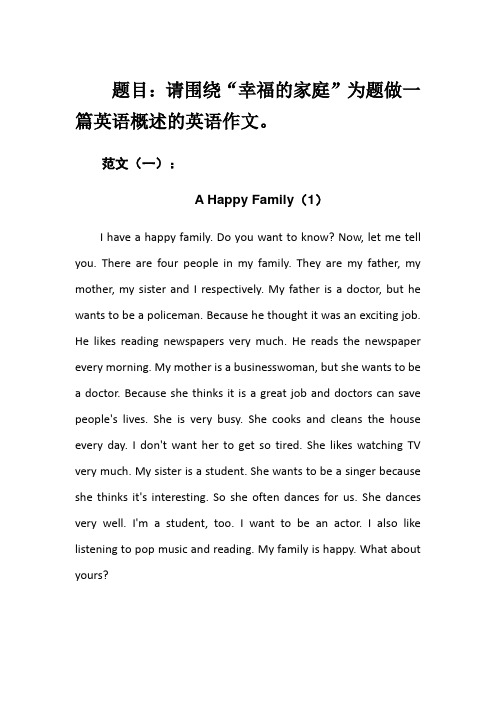
题目:请围绕“幸福的家庭”为题做一篇英语概述的英语作文。
范文(一):A Happy Family(1)I have a happy family. Do you want to know? Now, let me tell you. There are four people in my family. They are my father, my mother, my sister and I respectively. My father is a doctor, but he wants to be a policeman. Because he thought it was an exciting job. He likes reading newspapers very much. He reads the newspaper every morning. My mother is a businesswoman, but she wants to be a doctor. Because she thinks it is a great job and doctors can save people's lives. She is very busy. She cooks and cleans the house every day. I don't want her to get so tired. She likes watching TV very much. My sister is a student. She wants to be a singer because she thinks it's interesting. So she often dances for us. She dances very well. I'm a student, too. I want to be an actor. I also like listening to pop music and reading. My family is happy. What about yours?范文翻译(一):我有一个幸福的家庭。
才能让你和你的家人都变健康英语作文
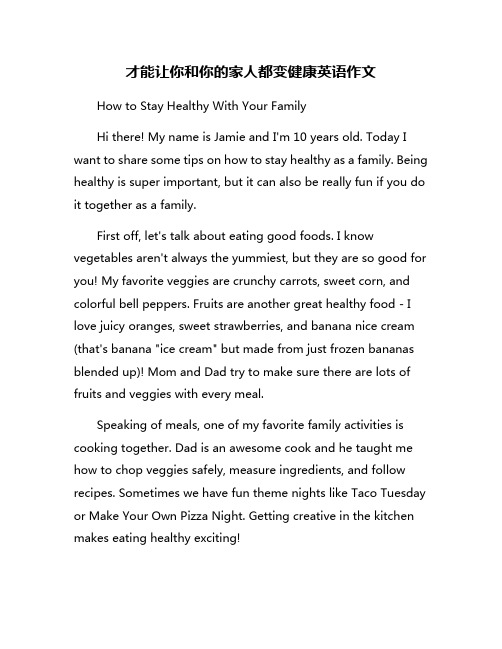
才能让你和你的家人都变健康英语作文How to Stay Healthy With Your FamilyHi there! My name is Jamie and I'm 10 years old. Today I want to share some tips on how to stay healthy as a family. Being healthy is super important, but it can also be really fun if you do it together as a family.First off, let's talk about eating good foods. I know vegetables aren't always the yummiest, but they are so good for you! My favorite veggies are crunchy carrots, sweet corn, and colorful bell peppers. Fruits are another great healthy food - I love juicy oranges, sweet strawberries, and banana nice cream (that's banana "ice cream" but made from just frozen bananas blended up)! Mom and Dad try to make sure there are lots of fruits and veggies with every meal.Speaking of meals, one of my favorite family activities is cooking together. Dad is an awesome cook and he taught me how to chop veggies safely, measure ingredients, and follow recipes. Sometimes we have fun theme nights like Taco Tuesday or Make Your Own Pizza Night. Getting creative in the kitchen makes eating healthy exciting!Water is also really important for staying healthy. My parents always make sure I have a reusable water bottle with me that I can refill throughout the day. We try to drink way more water than juice or soda. Water is just so refreshing and keeps your body hydrated.Another huge part of being healthy is staying active and getting exercise. One of my family's favorite activities is going for nature walks or hikes together on the weekends. We'll pack some healthy snacks and spend a few hours exploring local parks and trails. I love breathing in the fresh air and looking for cool bugs or animal footprints.At home, we also aim to stay active instead of just sitting on our devices or watching TV all the time. We'll put on some music and have family dance parties, or play active games in the backyard like tag or frisbee. Even just doing active chores like raking leaves or washing the car gets our bodies moving.My parents are also really big on making sure our family gets enough sleep. We have a pretty strict routine of winding down before bedtime by taking baths, reading books, and avoiding screens. I personally need around 10 hours of sleep each night to wake up feeling rested and recharged. Enough sleep is so important for growing kids like me!Sometimes staying healthy can be a challenge though, like when we're super busy with school, activities, and work. That's when we have to be extra mindful and plan ahead. My parents will meal prep healthy lunches and snacks, or we'll go for a quick family walk around the neighborhood after dinner. Every little bit of healthy habits adds up.Lastly, we make sure to stay on top of regular check-ups at the doctor and dentist. I know shots can be scary, but they help keep us from getting sick. The doctor and dentist can also give us personalized tips for eating right, exercising, and taking care of our bodies. It's just like taking your car in for tune-ups!Those are some of my top tips for having a healthy, happy family life. It's all about creating habits, staying active, eating nutritious foods, getting enough sleep, and looking out for each other. If you can turn healthy choices into quality family time, it makes it much easier and more fun. After all, families that play together and stay healthy together can keep being awesome together for many years to come!。
whatisafamily阅读理解
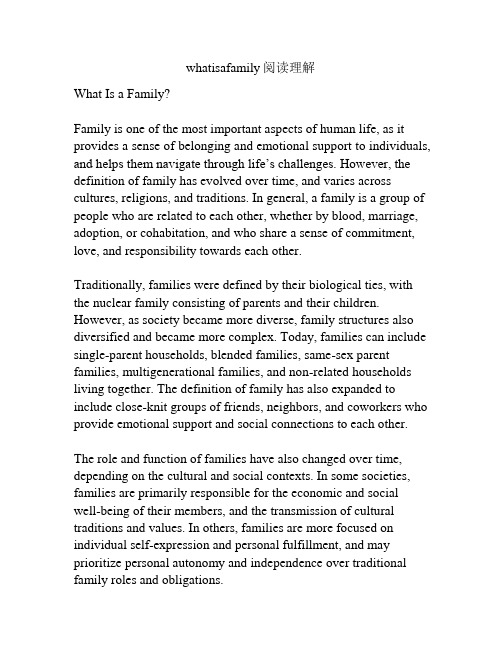
whatisafamily阅读理解What Is a Family?Family is one of the most important aspects of human life, as it provides a sense of belonging and emotional support to individuals, and helps them navigate through life’s challenges. However, the definition of family has evolved over time, and varies across cultures, religions, and traditions. In general, a family is a group of people who are related to each other, whether by blood, marriage, adoption, or cohabitation, and who share a sense of commitment, love, and responsibility towards each other.Traditionally, families were defined by their biological ties, with the nuclear family consisting of parents and their children. However, as society became more diverse, family structures also diversified and became more complex. Today, families can include single-parent households, blended families, same-sex parent families, multigenerational families, and non-related households living together. The definition of family has also expanded to include close-knit groups of friends, neighbors, and coworkers who provide emotional support and social connections to each other. The role and function of families have also changed over time, depending on the cultural and social contexts. In some societies, families are primarily responsible for the economic and socialwell-being of their members, and the transmission of cultural traditions and values. In others, families are more focused on individual self-expression and personal fulfillment, and may prioritize personal autonomy and independence over traditional family roles and obligations.Despite these variations, there are some common features and factors that characterize families across cultures and time periods. These include:1. Love and affection: Families are typically bound by strong emotional ties, and express care, concern, and love for each other.2. Mutual support: Family members often provide emotional, financial, and practical support to each other, especially during times of crisis or need.3. Communication: Effective communication is crucial for maintaining strong family relationships, and helps to resolve conflicts, express feelings, and make decisions together.4. Shared experiences: Families often share common experiences, such as holidays, celebrations, and vacations, that help to create shared memories and strengthen their bonds.5. Cultural and social norms: Families reflect the cultural and social norms of their communities, and may shape individuals’ beliefs, attitudes, and behaviors towards gender roles, marriage, parenting, and other aspects of social life.In conclusion, family is a complex and multifaceted concept that encompasses a wide range of social, economic, cultural, and emotional dimensions. While there is no single definition or model of what constitutes a family, it is clear that families play a vital role in shaping individuals’ identities, values, and relationships, andprovide a foundation of emotional support and love that can help individuals navigate through life’s ups and downs.Families are also important for the development and socialization of children. Parents and caregivers play a crucial role in shaping children’s physical, cognitive, social, and emotional development during their formative years. They provide love, nurturing, and guidance, and help children learn the norms, values, and skills that are necessary for success in their communities. Children who grow up in supportive, caring, and stable families are more likely to develop healthy self-esteem, social skills, and positive relationships with others.Moreover, families serve as the primary source of socialization and transmission of cultural norms and values across generations. They help to reinforce cultural traditions, beliefs, and language, and provide a sense of continuity and identity for individuals and communities. Families also play a critical role in the preservation and transmission of cultural knowledge, practices, and customs, and help to create a sense of belonging and connection to one’s cultural heritage.Another important function of families is their role in providing care and support for their elderly or disabled members. Families are usually the first and most significant source of care for older adults or family members with disabilities, and often provide emotional, physical, and financial care and support. In many cultures and societies, it is a duty and obligation for children to take care of their aging parents, and this traditional role of the family remains pivotal in the modern world today.On the other hand, families can also experience challenges and problems that can affect the well-being of their members. Family conflicts, abuse, divorce, and other disruptions can result in emotional trauma, stress, and poor mental and physical health outcomes. In some cases, families may not have the necessary resources or support systems to address these challenges, which can lead to negative outcomes for their members.In conclusion, families are a vital aspect of human life that provide emotional support, socialization, and cultural transmission across generations. They play a critical role in shaping individuals’ identities, values, and relationships, and provide a foundation of love and care that can help individuals deal with life’s challenges. However, families can also face challenges and problems that require support and intervention to prevent negative outcomes. Therefore, it is essential to acknowledge and support the diversity of family structures, cultural norms, and values, and create policies and programs that promote healthy family relationships and well-being.One of the challenges facing modern families is the changing social and economic landscape. In many societies today, families are facing increasing economic pressure, where both parents have to work outside the home to make ends meet. This can put a strain on family relationships as parents struggle to balance work and family responsibilities. Additionally, some families may experience social isolation and limited access to support networks, particularly in urban areas where social ties and community connections may be more tenuous.Another issue for families is the impact of technology and media on family relationships. While technology can facilitatecommunication and bring families closer together, it can also create new challenges, such as screen addiction, cyberbullying, and social isolation. Children and teenagers may spend long hours on social media and video games, leading to a loss of face-to-face interaction with their family members. This can undermine the development of social skills, emotional intelligence, and empathy, and create barriers to healthy family relationships.Moreover, families facing specific social issues such as mental illness, addiction, or chronic illness face unique challenges that may require specialized interventions and support. These families may require access to mental health services, addiction treatment programs, or support groups to help them cope with their unique circumstances. In addition, families who have experienced trauma, conflict, or abuse may require therapeutic interventions to address the emotional and psychological damage caused by these experiences.Despite these challenges, families remain a vital source of support and well-being for their members, and there are many resources available to help families navigate difficult times. Community organizations, social service agencies, and non-profit organizations provide a range of services, such as family counseling, financial assistance, and educational programs. Additionally, governments can support healthy family relationships by creating policies that promote family-friendly workplaces, affordable housing, and access to healthcare and education.In conclusion, families play a crucial role in shaping individuals' emotional, psychological, and social development, and provide afoundation of care and support that can help individuals tackle the challenges of life. However, families face many challenges in the modern world, including economic pressures, social isolation, and the impact of technology and media. It is essential to support families in addressing these challenges by creating policies and programs that promote healthy family relationships and well-being.Families remain a vital source of support and well-being for their members, shaping individuals' emotional, psychological, and social development. However, families today face various challenges in the changing social and economic landscape. Economic pressure and social isolation can strain family relationships, while technology can hinder face-to-face interaction and create new challenges. Families facing specific issues, such as mental illness, addiction or trauma, may require specialized interventions and support. Despite these challenges, resources such as community organizations, social service agencies, non-profit organizations, and government policies can promote healthy family relationships and support families in navigating difficult times. Supporting families is essential to fostering healthy family relationships and individual well-being.。
What is a healthy family
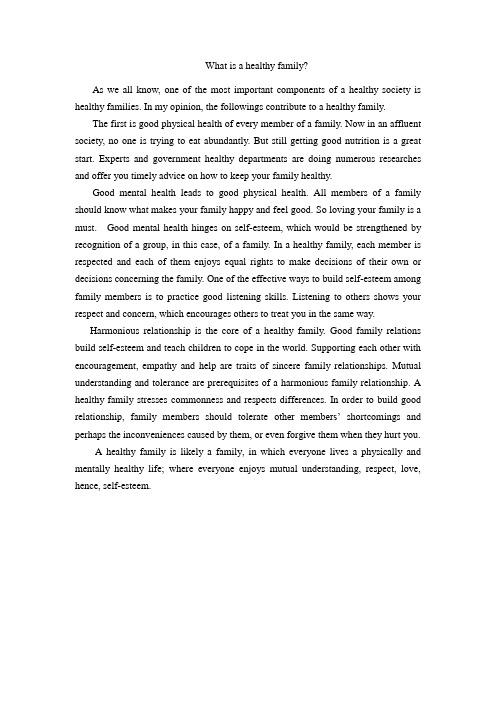
What is a healthy family?As we all know, one of the most important components of a healthy society is healthy families. In my opinion, the followings contribute to a healthy family.The first is good physical health of every member of a family. Now in an affluent society, no one is trying to eat abundantly. But still getting good nutrition is a great start. Experts and government healthy departments are doing numerous researches and offer you timely advice on how to keep your family healthy.Good mental health leads to good physical health. All members of a family should know what makes your family happy and feel good. So loving your family is a must. Good mental health hinges on self-esteem, which would be strengthened by recognition of a group, in this case, of a family. In a healthy family, each member is respected and each of them enjoys equal rights to make decisions of their own or decisions concerning the family. One of the effective ways to build self-esteem among family members is to practice good listening skills. Listening to others shows your respect and concern, which encourages others to treat you in the same way.Harmonious relationship is the core of a healthy family. Good family relations build self-esteem and teach children to cope in the world. Supporting each other with encouragement, empathy and help are traits of sincere family relationships. Mutual understanding and tolerance are prerequisites of a harmonious family relationship. A healthy family stresses commonness and respects differences. In order to build good relationship, family members should tolerate other members’shortcomings and perhaps the inconveniences caused by them, or even forgive them when they hurt you.A healthy family is likely a family, in which everyone lives a physically and mentally healthy life; where everyone enjoys mutual understanding, respect, love, hence, self-esteem.。
你家人的健康生英语作文初一
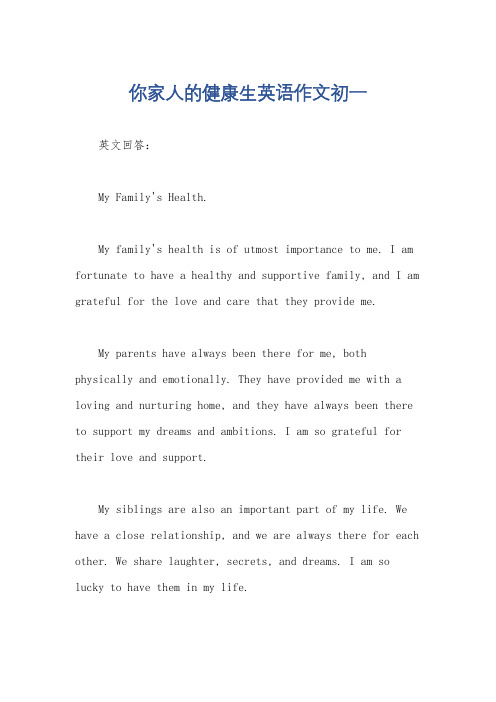
你家人的健康生英语作文初一英文回答:My Family's Health.My family's health is of utmost importance to me. I am fortunate to have a healthy and supportive family, and I am grateful for the love and care that they provide me.My parents have always been there for me, both physically and emotionally. They have provided me with a loving and nurturing home, and they have always been there to support my dreams and ambitions. I am so grateful for their love and support.My siblings are also an important part of my life. We have a close relationship, and we are always there for each other. We share laughter, secrets, and dreams. I am so lucky to have them in my life.My family's health is a gift that I cherish. I am so grateful for the love and support that they provide me. I will always be there for them, just as they have always been there for me.中文回答:我的家人健康。
- 1、下载文档前请自行甄别文档内容的完整性,平台不提供额外的编辑、内容补充、找答案等附加服务。
- 2、"仅部分预览"的文档,不可在线预览部分如存在完整性等问题,可反馈申请退款(可完整预览的文档不适用该条件!)。
- 3、如文档侵犯您的权益,请联系客服反馈,我们会尽快为您处理(人工客服工作时间:9:00-18:30)。
W hat’s a Healthy Family
The idea of what is a healthy family varied widely in different areas and periods, as well as different people. A family is the smallest unit in society. The roots of many social problems are within the families. So a healthy family not only is good for every member of hers, but also makes valuable contribution to the social harmony. With the development of our society, more and more family develop to a new pattern. Under such background, what’s a healthy family? Regardless of nationality, culture and religion, people may have some common views about what a healthy family is. For example, the Oriental and the Westerners all believe that love is the most important factor within a family. From my perspective, a healthy family should be provided with the following several conditions.
First and foremost, a healthy family is a harmonious, cozy and aggressive one. Every member in the family feels happy. But it is still not enough. A healthy family must take its responsibilities to gain the respect.
a healthy family should be a system of sharing responsibility. So, members in a healthy family must respect and help each other, and cooperate with each other towards a same goal.
Secondly, every member should respect for each other’s privacy. That is not mean we don’t communicate with each other. What we mean is that moderate space is necessary for everyone. Although family relationship is close, but no secret will make people feel uncomfortable.
Lastly but in no means least, the ability to bring quarrels to a quick and satisfying conclusion is very important. Many people believe that the closest people to the more likely to fight. Then how to solve these quarrels seems to become a headache problem. In fact, understanding each other is the most valuable wealth we should have,especially in family members. No matter what quarrels you have, a good dealing way is necessary for you.
Overall, a healthy family requires many conditions. Besides what we have refered, clear parental guidelines on right and wrong, easy interacti on among all family members is necessary. In a word, a healthy family need all of the family members try hard.。
